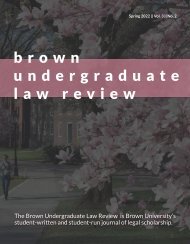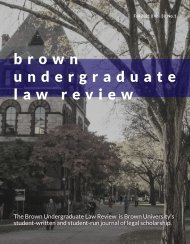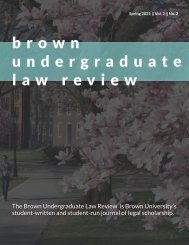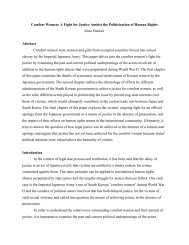Substantive Due Process: Dangerous or Necessary?
Carolyn Zech '24
Carolyn Zech '24
You also want an ePaper? Increase the reach of your titles
YUMPU automatically turns print PDFs into web optimized ePapers that Google loves.
physically harassing patients and doct<strong>or</strong>s, visiting the private residences of patients and staff,<br />
and jamming the clinic’s phone lines. Operation Rescue appealed, claiming that the injunction<br />
was a violation of their First Amendment rights to freedom of speech, freedom of association,<br />
and free exercise of religion. 11<br />
Neither side contested that the purpose of the injunction was to limit the free speech of<br />
Operation Rescue. The limitation of speech, however, does not violate the First Amendment per<br />
se—the Supreme Court has established that state governments can limit speech so long as the<br />
limitation is “narrowly-tail<strong>or</strong>ed to serve a significant government interest.” 12 The Fl<strong>or</strong>ida<br />
Supreme Court held that in this instance the injunction was constitutional because the state had<br />
two significant interests to protect: the right to medical privacy and the right to seek lawful<br />
prenatal care.<br />
The Court derived the f<strong>or</strong>mer interest from Frisby v. Schultz, wherein the Supreme Court<br />
held that the right to privacy within one’s home, labeled “residential privacy,” qualified as a<br />
compelling state interest to limit the free speech of pro-life picketers. 13 The Fl<strong>or</strong>ida Court<br />
concluded that the principle of residential privacy, which is intended to protect the most private<br />
spaces from unwanted speech, extends to medical affairs as well; just as Fl<strong>or</strong>ida’s citizens have a<br />
right to control the speech within their homes, they have a right to avoid confrontation about<br />
their most private medical matters, especially if such conflict risks endangering their health and<br />
safety. In this case, the court found that the state was reasonable in concluding that the pro-life<br />
protest<strong>or</strong>s, who often approached clinic visit<strong>or</strong>s to discuss their medical decisions without their<br />
consent, may have violated the women’s medical privacy and caused them high enough levels of<br />
fear and anxiety that they would be at heightened risk during their procedures. 14<br />
The right to seek prenatal care is also based on Supreme Court precedent—specifically,<br />
Roe v. Wade (1973). Unlike its approach with the first state interest, the Court does not explain in<br />
detail how the current case connects with the precedent, only stating that the right to seek<br />
prenatal care is a “clear personal right” under Roe. 15 The fact that an implicit derivation of a right<br />
to privacy in Roe had become clear constitutional precedent to the Fl<strong>or</strong>ida court demonstrates the<br />
11<br />
Operation Rescue v. Women's Health Ctr., 626 So. 2d 664, 1993 Fla. LEXIS 1739, 18 Fla. L. Weekly S<br />
559 (Supreme Court of Fl<strong>or</strong>ida October 28, 1993, Decided), 14.<br />
12<br />
Operation Rescue v. Women's Health Ctr., 626 So. 2d 664, 21.<br />
13<br />
Operation Rescue v. Women's Health Ctr., 626 So. 2d 664, 23.<br />
14<br />
Operation Rescue v. Women's Health Ctr., 626 So. 2d 664, 24.<br />
15<br />
Operation Rescue v. Women's Health Ctr., 626 So. 2d 664, 22.










